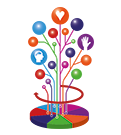This text is an abstract of the book Skill Sheets – an Integrated Approach to Research, Study and Management.
1. Goals of the Skill Sheets Collection
The Skill Sheets collection has been designed as a practical tool to help students work through the skill circle and linking the various skills at ever higher levels of mastery and sophistication. Once you have understood the basic logic of this approach, you will find it hard to stop learning! None of the skills is solely “product” or “process” oriented. Sometimes the skills are easy to develop and master, but more often they require intensive training over longer periods of time. They always have to be linked to real research and content, otherwise you will only learn a number of ‘tricks’ without substance. The Skill Sheets are designed to support tutors and students in this training process.
2. The Skill Circle
To survive in a bargaining society you have to be a smart negotiator capable of maximizing your short-term benefits (get good grades for your exams and assignments). But academia as a learning environment can be so much more. To move beyond a mere survival strategy you have to work on and master a set of basic skills at a sufficiently high level. These skills can be identified by a Skill circle that can be depicted by two overlapping scales. First along a social scale skills can be positioned from purely individual to group skills. Secondly, skills have a process scale that runs from input oriented to output oriented skills. This basic distinction results in seven relevant basic skills: research and analytical skills, study and self-management skills, reading, listering, writing, presentation and team- and project management skills.
3. The Skill Circle as an organic whole: creating linkages
Output oriented skills (writing and presentation) are a necessary precondition for becoming a skilled person. However, they are never sufficient preconditions. They should have a meaningful contents, which is based on input oriented skills such as reading and listening. Dealing with skills effectively means linking the various parts of the Skill Circle. Skills can and have to be distinguished, but it is problematic –even foolish – to separate them. Specialised skills training often lack effectiveness when they are devoid of content, good feedback and lack awareness of how they are linked to other skills. If you become aware of this mechanism, the Skill Circle becomes an organic whole and skill development a natural and daily phenomenon.
4. Skill Development as managing circular cycles
Research skills are the undisputed ‘linking pin’ of all other skills. The learning cycle of research can also be portrayed as a ‘reflective’ circle or cycle. Going through the circle in the right order is vital to the learning process; from problem, via problem definition, diagnosis to the design of a possible solution. Only then you can implement solutions and evaluate them.

